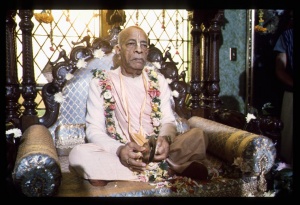CC Antya 7.104: Difference between revisions
m (1 revision(s)) |
(Vanibot #0054 edit - transform synonyms into clickable links, which search similar occurrences) |
||
| (One intermediate revision by one other user not shown) | |||
| Line 1: | Line 1: | ||
{{ | [[Category:Sri Caitanya-caritamrta - Antya-lila Chapter 07]] | ||
<div style="float:left">'''[[Sri Caitanya-caritamrta|Śrī Caitanya-caritāmṛta]] - [[CC Antya|Antya-līlā]] - [[CC Antya 7|Chapter 7: The Meeting of Śrī Caitanya Mahāprabhu and Vallabha Bhaṭṭa]]'''</div> | |||
<div style="float:right">[[File:Go-previous.png|link=CC Antya 7.103|Antya-līlā 7.103]] '''[[CC Antya 7.103|Antya-līlā 7.103]] - [[CC Antya 7.105|Antya-līlā 7.105]]''' [[File:Go-next.png|link=CC Antya 7.105|Antya-līlā 7.105]]</div> | |||
{{CompareVersions|CC|Antya 7.104|CC 1975|CC 1996}} | |||
{{RandomImage}} | |||
==== TEXT 104 ==== | ==== TEXT 104 ==== | ||
<div | <div class="verse"> | ||
pati-vratā hañā patira nāma nāhi laya | :pati-vratā hañā patira nāma nāhi laya | ||
tomarā kṛṣṇa-nāma laha,—kon dharma haya? | :tomarā kṛṣṇa-nāma laha,—kon dharma haya?" | ||
</div> | </div> | ||
| Line 12: | Line 16: | ||
==== SYNONYMS ==== | ==== SYNONYMS ==== | ||
<div | <div class="synonyms"> | ||
pati- | ''[//vanipedia.org/wiki/Special:VaniSearch?s=pati&tab=syno_o&ds=1 pati]-[//vanipedia.org/wiki/Special:VaniSearch?s=vratā&tab=syno_o&ds=1 vratā]'' — devoted to the husband; ''[//vanipedia.org/wiki/Special:VaniSearch?s=hañā&tab=syno_o&ds=1 hañā]'' — being; ''[//vanipedia.org/wiki/Special:VaniSearch?s=patira&tab=syno_o&ds=1 patira]'' — of the husband; ''[//vanipedia.org/wiki/Special:VaniSearch?s=nāma&tab=syno_o&ds=1 nāma]'' — name; ''[//vanipedia.org/wiki/Special:VaniSearch?s=nāhi&tab=syno_o&ds=1 nāhi] [//vanipedia.org/wiki/Special:VaniSearch?s=laya&tab=syno_o&ds=1 laya]'' — does not utter; ''[//vanipedia.org/wiki/Special:VaniSearch?s=tomarā&tab=syno_o&ds=1 tomarā]'' — all of you; ''[//vanipedia.org/wiki/Special:VaniSearch?s=kṛṣṇa&tab=syno_o&ds=1 kṛṣṇa]-[//vanipedia.org/wiki/Special:VaniSearch?s=nāma&tab=syno_o&ds=1 nāma]-[//vanipedia.org/wiki/Special:VaniSearch?s=laha&tab=syno_o&ds=1 laha]'' — chant the name of Kṛṣṇa; ''[//vanipedia.org/wiki/Special:VaniSearch?s=kon&tab=syno_o&ds=1 kon]'' — what; ''[//vanipedia.org/wiki/Special:VaniSearch?s=dharma&tab=syno_o&ds=1 dharma]'' — religious principle; ''[//vanipedia.org/wiki/Special:VaniSearch?s=haya&tab=syno_o&ds=1 haya]'' — is it. | ||
</div> | </div> | ||
| Line 19: | Line 23: | ||
==== TRANSLATION ==== | ==== TRANSLATION ==== | ||
<div | <div class="translation"> | ||
"It is the duty of a chaste wife, devoted to her husband, not to utter her husband's name, but all of you chant the name of Kṛṣṇa. How can this be called a religious principle?" | |||
</div> | </div> | ||
__NOTOC__ | |||
<div style="float:right; clear:both;">[[File:Go-previous.png|link=CC Antya 7.103|Antya-līlā 7.103]] '''[[CC Antya 7.103|Antya-līlā 7.103]] - [[CC Antya 7.105|Antya-līlā 7.105]]''' [[File:Go-next.png|link=CC Antya 7.105|Antya-līlā 7.105]]</div> | |||
__NOTOC__ | |||
__NOEDITSECTION__ | |||
Latest revision as of 20:54, 19 February 2024
Śrī Caitanya-caritāmṛta - Antya-līlā - Chapter 7: The Meeting of Śrī Caitanya Mahāprabhu and Vallabha Bhaṭṭa

His Divine Grace
A.C. Bhaktivedanta Swami Prabhupada
A.C. Bhaktivedanta Swami Prabhupada
TEXT 104
- pati-vratā hañā patira nāma nāhi laya
- tomarā kṛṣṇa-nāma laha,—kon dharma haya?"
SYNONYMS
pati-vratā — devoted to the husband; hañā — being; patira — of the husband; nāma — name; nāhi laya — does not utter; tomarā — all of you; kṛṣṇa-nāma-laha — chant the name of Kṛṣṇa; kon — what; dharma — religious principle; haya — is it.
TRANSLATION
"It is the duty of a chaste wife, devoted to her husband, not to utter her husband's name, but all of you chant the name of Kṛṣṇa. How can this be called a religious principle?"